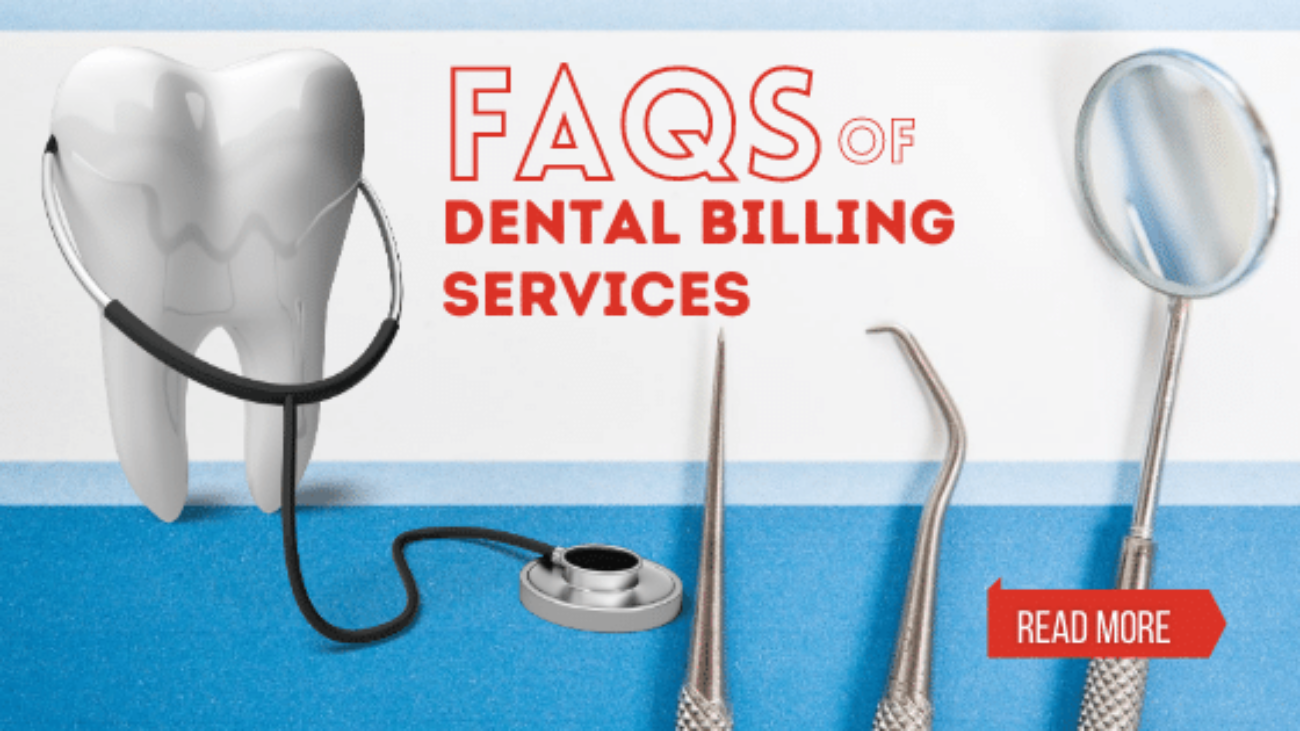Did you know that Dental billing services are completely different from the usual medical billing services in healthcare revenue Cycle management companies? If healthcare providers are unaware of exact dental insurance, the claim processing becomes hard and revenue payments will be delayed and most often denied.
What is Dental Billing?
- Dental billing is unrelated to medical billing and coding processes.
- Dental billing has different set of codes to be used while filing a claim.
- Insurance companies are keen on dental insurance as they don’t accept medical insurance for dental procedures.
- Healthcare revenue cycle management companies often confronts risk at this point. Dental billing and coding is quite tricky part for providers.
- Dental billing relies on the type of insurance coverage chosen by the patient.
- In order to avail dental procedures, dental insurance must be obtained by the patient, or else the money goes out of pocket.
- The provider services commonly has three types of insurance coverage to choose.
- They are :
- Medical Insurance
- Vision Insurance
- Dental Insurance
- To undergo the process of dental billing, healthcare revenue Cycle management companies or healthcare providers must only bill with dental insurance.
- Otherwise the insurance companies will deny the payments for the dental procedures rendered by healthcare providers. So, special attention towards dental billing is necessary.
- To the matter of fact, most of the dental billing claims are submitted through email in paper work. Electronic forms are mostly avoided as the claims would contain required attachments of radiographs, periodontal charts to prove medical necessity.
Additional Details on Dental Claims Include:
- Area of Oral Cavity
- Tooth System
- Tooth number or letter
- Tooth surface
- Description of procedure
- Missing teeth information
Dental Claims needs Expertise from healthcare revenue cycle management companies:
- Dental billing services would require efficiency, less expenses, investment in technology as well as experts assistance for cost effectiveness and productivity.
- The most important factor that’s essential to operate dental billing at ease is seamless flow of revenue. Skilled and experienced team can guarantee less A/R days and limited errors sometimes error free claims for submission.
- Healthcare revenue cycle management companies will have to concentrate more on employing expertise for dental billing alone as dental billing has changed from free services to insurance dependent.
- Dental insurance will need accurate information with more details of patient and diagnosis procedures involved.
- If a dental billing company or service can’t afford a dedicated team to chase the insurance claims and balances, then dental providers are into big trouble.
How does Dental Insurance work?
- Dental insurance work in a different manner. Skilled dental billing team of healthcare revenue cycle management companies will get providers paid in three weeks if the claims are sent clean.
- Otherwise errors will definitely interrupt healthcare professionals cash flow. Clean claims consume expert’s time, clinical knowledge and frequent follow up for hours.
- Very common issues confronted among dental billing is:
- Lack of time
- Interruptions with phone calls
- Lack of experts to deal with dental insurance, coding and claims processing.
- These issues result in rejected and denied claims which could halt revenue payments and revenue cycle process.
- Several errors that stops revenue flow due to denials and rejections are :
- Inaccurate patient demographic details
- Improper documentation without necessary information
- Less or minimum information
- Wrong insurance set up
- Improper insurance set up without knowledge on plans
- Claims not filed on time.
- As dental insurance decreases, patients company increases. Hence, patient’s treatment plan acceptance decreases and account receivables increases.
- If patient balances get out of service, patient account balance get out of control and it will be difficult for the team to work for collections. Reimbursement becomes difficult and it affects cash flow.
Dental Billing for Dental Surgery:
- Healthcare revenue cycle management companies paves a way for billing dental surgery to make easy for availing treatment or dental procedures.
- Dental insurance billing is not an easy task as it has very less benefits. Medical insurance for dental surgery might provide better reimbursement rates compares to dental billing if only medical billing capabilities are added to medical practice.
To document medical necessity:
- In order to receive revenue payments from medical insurance apart from dental insurance, healthcare professionals will have to prove the necessity for dental surgery.
- Healthcare professionals will have to explain their case and decision process in terms where medical insurance understands the use of ICD-10 and CPT codes.
- These particular codes looks similar to CDT codes but are more detailed compared to CPT and will consume time to learn the coding.
- For billing dental surgery and collection of payments from medical insurance healthcare professionals or healthcare revenue cycle management companies will need to have:
- Primary presenting situation
- Secondary diagnosis
- Diagnosis code for planned treatment
- Surgical pre-authorization
- A letter form for medical necessity
- Supporting letter from primary physician
- The procedure performed at surgery location.
- These documents provide the complete information required for medical insurance to process dental surgery claim. It explains the seriousness of the issue as it doesn’t only come under dental but also medical. It’s also eligible for medical reimbursement.
What should the letter of medical necessity contain?
- The letter for medical necessity should explain the outline of the case.
- The letter should contain proper usage of ICD-10 codes or the letter will not be accepted.
- Limited use of four diagnosis codes in an order from most important coding procedures to the least important coding procedures.
- Expand your information by explaining the factors of patient’s medical history.
- Explain the procedure and the factors clearly even if choosing the codes are confusing.
- Get another letter signed by patient PCP to remain supportive.
- The letter should convince the medical insurance company and understand treatment procedures and necessity so that reimbursements are made on time.
Hope you got the information on Dental billing. For any suggestions, please comment below. We will consider them if relevant to the topic. For more queries and updates on healthcare, please subscribe to our blog.




